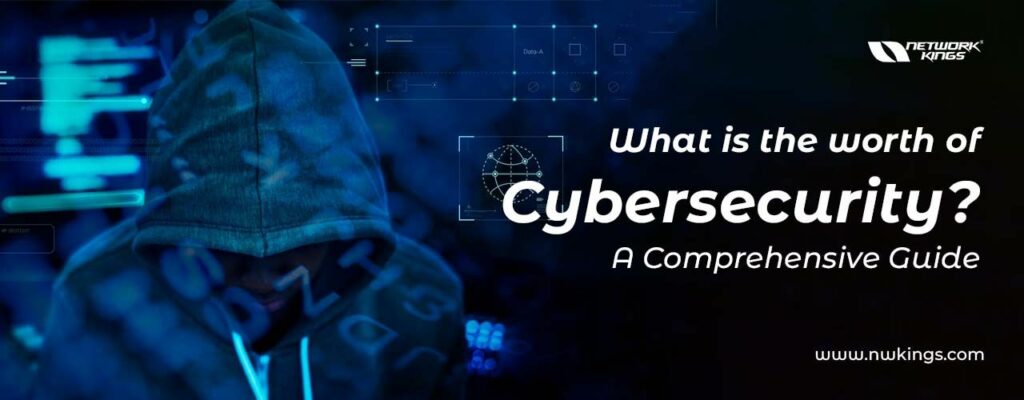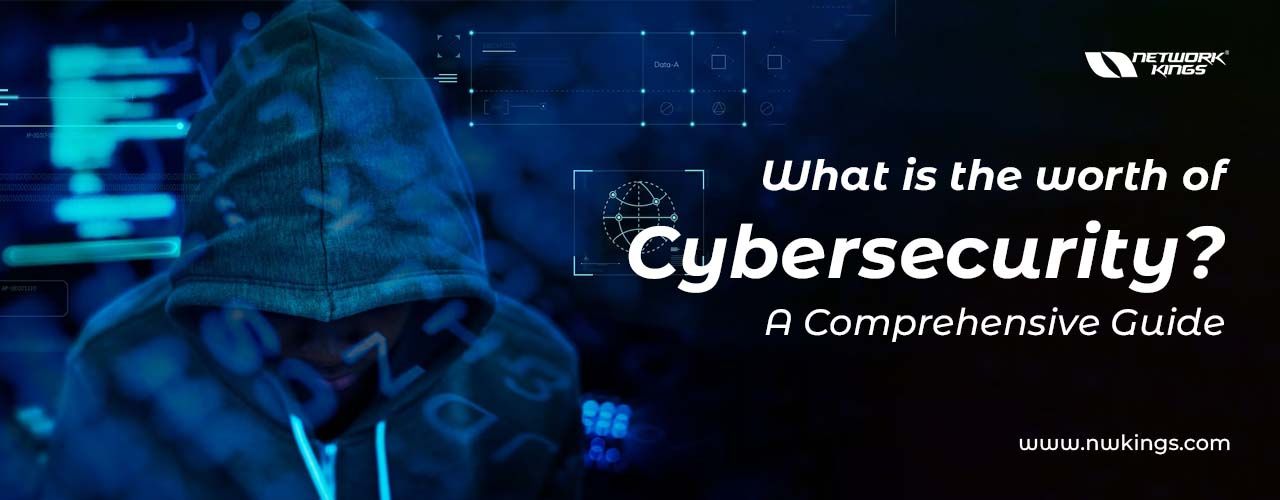
Do you want to know the reasons why Cybersecurity is important? In today’s interconnected world, where the majority of our transactions, communications, and data are conducted online, the need for robust cybersecurity measures has never been more critical.
In this blog post, we will explore the reasons why cyber security is important for businesses, modern-day society, students, and individuals. By understanding the significance of cybersecurity, we can take proactive steps to safeguard our digital assets and ensure a secure online environment.
What is Cybersecurity?
Cybersecurity refers to the practice of protecting computers, servers, mobile devices, networks, and electronic systems from digital attacks, unauthorized access, and data breaches.
The Growing Landscape of Cyber Threats
The global average cost of a data violation in 2023 was $4.45 million, a 15% growth over three years (IBM).
There are various types of Cyber Attacks/ threats. Some of these are- Malware, Denial-of-service [DoS] Attacks, Phishing, Spoofing, Identity-based attacks, Code injection attacks, Supply chain attacks, Insider threats, DNS Tunneling, and IoT-based attacks.
Data associated with 700 million LinkedIn users was published for sale in a Dark Web forum in June 2021. This vulnerability affected 92% of the total LinkedIn user base of 756 million users.
Why Cyber Security is Important for Businesses?
Cybersecurity is crucial for businesses as it is mandatory to ensure the safety of the business. Here are some of the reasons why cybersecurity is important for business:
- Protection of Sensitive Data: Businesses handle an abundance of sensitive information such as customer data, financial records, academic property, and trade mysteries. Cybersecurity measures ensure that this valuable information stays hidden and shielded from unauthorized keys or stealing.
- Prevention of Financial Loss: Cyber attacks can result in significant financial failures for companies. A successful violation can lead to expensive legal actions, regulatory fines, loss of revenue due to downtime or system disruptions, and damage to the company’s importance. Enforcing strong cybersecurity protection helps mitigate these risks.
- Preserving Customer Trust: In an era where data breaches and cyber-attacks dominate headlines, customers have become more concerned about the safety of their personal information. By prioritizing cybersecurity, companies can build trust with customers by ensuring them that their data is saved.
- Adherence with Regulations: Relying on the industry and geographical location, businesses must follow various data protection regulations such as the General Data Protection Regulation (GDPR) in the European Union or the Health Insurance Portability and Accountability Act (HIPAA) in the United States. Sticking to these regulations helps evade legal effects and disadvantages.
- Protection of Intellectual Property: Intellectual property theft is a considerable concern for businesses, particularly those interested in research, development, or innovation. Robust cybersecurity estimates security proprietary information from being robbed by opponents or hostile actors.
Why Cyber Security is Important for Modern-day Society?
Cybersecurity plays a vital role in ensuring the smooth functioning of modern-day society. As our reliance on technology continues to grow, the following reasons highlight the importance of cybersecurity for society as a whole:
- Security of Critical Infrastructure: Critical infrastructure, including power grids, transportation systems, healthcare facilities, and government networks, is prone to cyber-attacks. Protecting these systems is necessary to stop troubles that could have far-reaching effects on public safety and national security.
- Stopping Disinformation and Cyber Warfare: With the promotion of social media platforms and online news sources, disinformation campaigns and cyber warfare have become important hazards. Cybersecurity measures help determine and balance these negative activities that seek to influence public opinion or destabilize nations.
- Preserving Online Voting Systems: As more countries study online voting options, providing the goodness and safety of these systems is important. Cybersecurity protocols safeguard against potential tampering or manipulation of election results, keeping faith in democratic processes.
- Safeguard Against Identity Theft: Identity theft is a general crime in the digital age. Cybersecurity efforts can help prevent unauthorized access to personal information, decreasing the risk of individuality theft and financial fraud.
- Protecting Personal Privacy: With rising concerns over data privacy violations and management practices, cybersecurity measures are necessary to safeguard individuals’ personal privacy rights. Strong encryption methods and safe communication channels ensure that personal information stays confidential and protected.
Why Cybersecurity is Important for Students?
Cybersecurity is critically necessary for students for various reasons, reflecting the increasing digitalization of education and the growing online presence of students. Here are some key reasons why cybersecurity should be a preference for students:
- Protection of Personal Information: Students often share a considerable amount of private information online, including names, addresses, and financial elements. Cybersecurity measures enable the protection of this sensitive data from identity theft, fraud, and other types of cybercrime.
- Safeguarding Educational Data: Students’ educational records, including grades, coursework, and assessment results, are increasingly driven online. Effective cybersecurity helps save this data from unauthorized access and manipulation.
- Deterence of Cyber Bullying: The online environment can be a platform for bullying and harassment. Comprehending cybersecurity and rehearsing safe online behavior can assist students in defending themselves and others from such negative incidents.
- Safeguarding Online Learning Platforms: With the rise of e-learning, students often get hands-on educational resources and platforms online. Cybersecurity confirms the virtue and availability of these resources, defending against disorders caused by cyber-attacks like Denial of Service (DoS) attacks.
- Creating Safe Online Habits: Students are growing up in a digital world. Comprehending cybersecurity helps them design safe and reliable online habits, which is important for their personal security and digital footprint.
- Career Options: As the field of cybersecurity grows, there’s an increasing need for professionals with cybersecurity skills. Early direction for students can spark curiosity in this field, directing them to practical career prospects.
- Protection Against Malware and Viruses: Students often download and exchange multiple files for their studies. Understanding cybersecurity helps them identify and avoid negative software that can compromise their devices and personal information.
- Awareness of Phishing Scams: Students, particularly in higher education, are regularly marked of phishing attempts. Cybersecurity education can teach them to recognize such scams and safeguard their credentials and financial information.
- Ensuring Compliance with Regulations: In some cases, students who work with sensitive data (like in research projects) must comply with legal and regulatory provisions related to data protection. Cybersecurity attention is vital for this compliance.
- Building a Culture of Security: As students learn about cybersecurity, they contribute to building a more secure digital environment at their educational institutions and in their future workplaces.
In essence, cybersecurity is not just about saving networks and data; it’s about safeguarding the well-being, privacy, and aspirations of students in an increasingly connected world.
Exploring the Reasons Why Cybersecurity is Important
- The emergence of Advanced Threats: The digital landscape is growing rapidly, with cybercriminals employing refined techniques to manipulate exposures. Cybersecurity measures help organizations stay ahead of these dangers by executing strong security mechanisms.
- Rapidly Changing Technology: As technology advances, new vulnerabilities arise. Cybersecurity assures that organizations adjust to these changes by constantly revising their systems and embracing the most delinquent security measures.
- Growing Internet of Things (IoT): The increasing number of connected devices in our homes, workplaces, and public spaces offers new challenges for cybersecurity. Guarding these devices from unauthorized access is required to stop potential violations that could compromise personal privacy or promote large-scale attacks.
- Global Interconnectivity: The affiliated nature of our digital world means that cyber attacks can arise from anywhere globally. Therefore, implementing cybersecurity measures is important for defending against both domestic and international dangers.
- Human Error and Insider Threats: Despite having strong security systems in place, human error or deliberate insider threats can still pose considerable risks to organizations’ cybersecurity. Training employees on best practices and boosting attention to potential threats mitigates these threats.
What is the Future of Cybersecurity?
Here is the future of cybersecurity:
- Grown Reliance on Artificial Intelligence and Machine Learning: AI and ML are becoming essential in noticing and reacting to cyber threats. These technologies can examine vast quantities of data to recognize patterns and irregularities that reveal possible hazards, directing faster and more efficient reactions.
- Development in Quantum Computing: While quantum computing presents groundbreaking opportunities in diverse fields, it also poses important challenges to cybersecurity. Traditional encryption methods may become outdated, driving the development of quantum-resistant cryptography.
- Rise of IoT and Smart Devices: As the Internet of Things (IoT) expands, so does the attack surface for cyber dangers. Ensuring the group of connected devices will become increasingly important, requiring more powerful and scalable cybersecurity solutions.
- Complexity of Cyber Attacks: Cyber attacks are becoming more sophisticated, using advanced techniques like deep fakes, AI-driven attacks, and state-sponsored hacking. This will mandate more developed defense mechanisms in cybersecurity.
- Increasing Importance of Privacy and Data Protection: With regulations like GDPR and CCPA, there is an increasing focus on data privacy and security. Companies will need to prioritize adherence and secure handling of personal data, leading to enhanced cybersecurity measures.
- More significant Demand for Cybersecurity Professionals: The need for skilled cybersecurity professionals will continue to increase. This demand may lead to more academic programs, certifications, and professional development opportunities in the field.
- Expansion of Cloud Security: As more organizations relocate to the cloud, the focus on cloud security will strengthen. This contains the evolution of secure cloud architectures, improved access controls, and enhanced security protocols for cloud-based systems.
- Development of 5G Networks: The roll-out of 5G will deliver more rapid speeds and more connections, but it also presents new security challenges. Guaranteeing the security of 5G networks will be a crucial guide for cybersecurity professionals.
- Integration of Blockchain in Security: Blockchain technology can improve security for various applications, including secure transactions, uniqueness verification, and safeguarding IoT devices.
- Focus on Cyber Resilience: Organizations will move focus from just stopping attacks to making systems that can resist and quickly recover from a violation. This approach, known as cyber resilience, concerns planning, response, and recovery strategies for cyber incidents effectively.
What are the Best Courses to Become a Cybersecurity Expert?
Here are the popular cybersecurity courses and certifications to become a cybersecurity professional:
CeH v12: A Certified Ethical Hacker (CEH) course is a skilled professional training program that covers a wide range of topics, including network security, cryptography, web application security, and system hacking. The sole purpose of the CEH course is to recognize individuals who have demonstrated the knowledge and skills to understand and identify weaknesses and vulnerabilities in a computer system through CEH training. During the course program, you will learn to prevent the chance of any malicious hacking that can exploit the system if not detected on time. The CEH Certification course has a global recognition that imitates the skills and techniques of Hostile Hackers.
CISSP: The CISSP training program comprises designing, implementing, and managing best-in-class cybersecurity programs. With a CISSP certification, one can validate one’s expertise and evolve as an (ISC)² member by opening an expansive exhibition of premier resources, scholarly devices, and peer-to-peer networking possibilities.
CompTIA Security+: The CompTIA Security+ course certification is offered by the non-profit trade association CompTIA which focuses on providing interactive information along with managing the risks. CompTIA Security+ training is considered an entry-level credential of CyberSecurity which helps in learning all the foundational skills that demand cybersecurity skills including system administrator, security administrator, and network administrator for IT Jobs.
CompTIA PenTest+: The CompTIA PenTest+ Certification course provides the skills required to plan, scan, and perform vulnerability and penetration testing as it is both, a knowledge-based and performance-based PenTest+ exam. Since the PenTest+ course refers to testing a computer system, network, or web application to find security vulnerabilities that can be damaged by malicious cyber attacks, CompTIA PenTest+ training covers the security of all the technologies. It is the only exam available to date that covers all the vulnerability management requirements. The exam includes cloud, hybrid environment, web applications, Internet of Things (IoT), and traditional on-premises testing skills.
CompTIA A+: The CompTIA A+ course certification is offered by the non-profit trade association CompTIA which focuses on providing all the knowledge and skills associated with the Initial Security Protocols in IT Systems and also teaches how to run and manage different kinds of OS on Multiple Devices at the same time. CompTIA A+ training also prepares you to learn and run the basic level Data Backup and Recovery Services. A+ course is considered a certification course that can brush up your skills in troubleshooting and supporting and maintenance of IT Infrastructure.
CompTIA Network+: The CompTIA Network+ course certification is offered by the non-profit trade association CompTIA which helps you learn the skills essential to establish, maintain, and troubleshoot important networks without any threat or danger as a lot of businesses are dependent on those networks. CompTIA Network+ training also prepares you to provide support to networks on any kind of platform. The CompTIA Network+ course is known to be the way to progress for those Individuals who want to carry on further to the path of CompTIA’s Network+ training certification as it helps design and implement functional networks.
CompTIA CySA+: The CompTIA CySA+ course certification is offered by the non-profit trade association CompTIA which helps you in emphasizing software and application security, automation, threat hunting, and IT regulatory compliance, which affects the daily work of security analysts.
Conclusion
As we have explored reasons why cyber security is important throughout this blog post, cyber security is vital for businesses, modern-day society, students, and individuals alike. The reasons why cyber security is important range from protecting sensitive data and financial interests to preserving national security and personal privacy. By prioritizing cybersecurity measures and staying informed about emerging threats and best practices, we can collectively create a safer digital environment for everyone.




